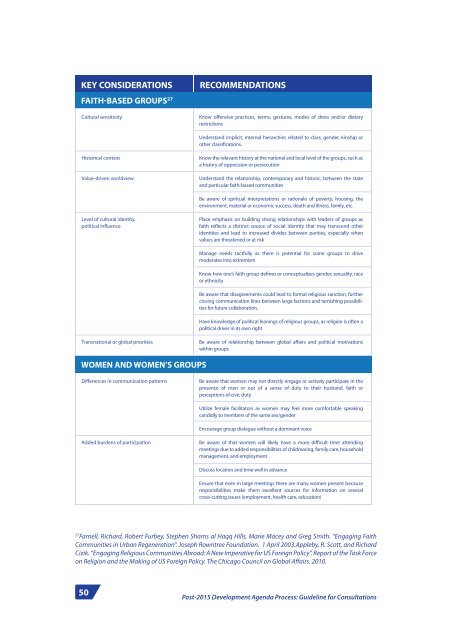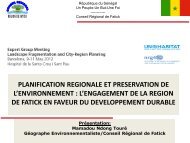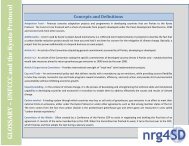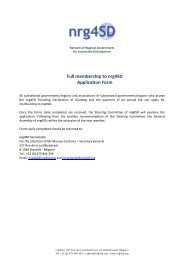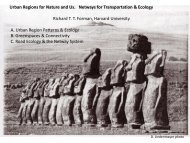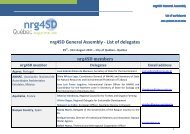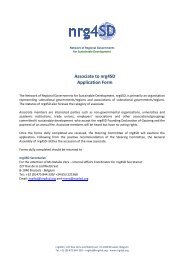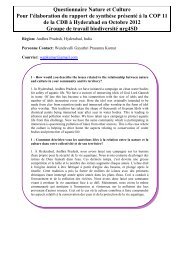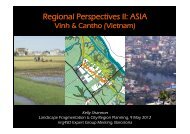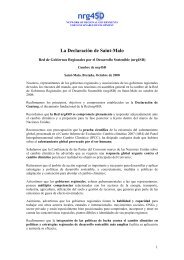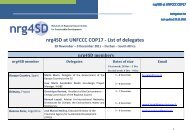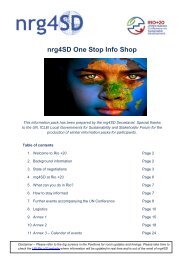Post 2015 Development Agenda: Guidelines for Country ... - nrg4SD
Post 2015 Development Agenda: Guidelines for Country ... - nrg4SD
Post 2015 Development Agenda: Guidelines for Country ... - nrg4SD
- No tags were found...
Create successful ePaper yourself
Turn your PDF publications into a flip-book with our unique Google optimized e-Paper software.
KEY CONSIDERATIONSRECOMMENDATIONSFAITH-BASED GROUPS 27Cultural sensitivityKnow offensive practices, terms, gestures, modes of dress and/or dietaryrestrictionsUnderstand implicit, internal hierarchies related to class, gender, kinship orother classifications.Historical contextValue-driven worldviewKnow the relevant history at the national and local level of the groups, such asa history of oppression or persecutionUnderstand the relationship, contemporary and historic, between the stateand particular faith-based communitiesBe aware of spiritual interpretations or rationale of poverty, housing, theenvironment, material or economic success, death and illness, family, etc.Level of cultural identity,political influencePlace emphasis on building strong relationships with leaders of groups asfaith reflects a distinct source of social identity that may transcend otheridentities and lead to increased divides between parities, especially whenvalues are threatened or at riskManage needs tactfully as there is potential <strong>for</strong> some groups to drivemoderates into extremismKnow how one’s faith group defines or conceptualizes gender, sexuality, raceor ethnicityBe aware that disagreements could lead to <strong>for</strong>mal religious sanction, furtherclosing communication lines between large factions and tarnishing possibilities<strong>for</strong> future collaboration.Have knowledge of political leanings of religious groups, as religion is often apolitical driver in its own rightTransnational or global prioritiesBe aware of relationship between global affairs and political motivationswithin groupsWOMEN AND WOMEN’S GROUPSDifferences in communication patternsBe aware that women may not directly engage or actively participate in thepresence of men or out of a sense of duty to their husband, faith orperceptions of civic dutyUtilize female facilitators as women may feel more com<strong>for</strong>table speakingcandidly to members of the same sex/genderEncourage group dialogue without a dominant voiceAdded burdens of participationBe aware of that women will likely have a more difficult time attendingmeetings due to added responsibilities of childrearing, family care, householdmanagement, and employmentDiscuss location and time well in advanceEnsure that even in large meetings there are many women present becauseresponsibilities make them excellent sources <strong>for</strong> in<strong>for</strong>mation on severalcross-cutting issues (employment, health care, education)27Farnell, Richard, Robert Furbey, Stephen Shams al Haqq Hills, Marie Macey and Greg Smith. “Engaging FaithCommunities in Urban Regeneration”. Joseph Rowntree Foundation. 1 April 2003.Appleby, R. Scott, and RichardCizik. “Engaging Religious Communities Abroad: A New Imperative <strong>for</strong> US Foreign Policy”. Report of the Task Forceon Religion and the Making of US Foreign Policy. The Chicago Council on Global Affairs. 2010.50<strong>Post</strong>-<strong>2015</strong> <strong>Development</strong> <strong>Agenda</strong> Process: Guideline <strong>for</strong> Consultations


